- Clone
- OX-104 (See other available formats)
- Regulatory Status
- RUO
- Workshop
- VII 70655
- Other Names
- OX-2, OX2
- Isotype
- Mouse IgG1, κ
- Ave. Rating
- Submit a Review
- Product Citations
- publications
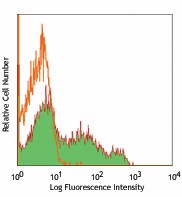
-

Human peripheral blood lymphocytes stained with biotinylated OX-104, followed by Sav-PE
CD200, also known as OX2, is a member of the immunoglobulin superfamily (IgSF). It is a monomorphic cell surface glycoprotein that is expressed on thymocytes, neurons, endothelium, follicular dendritic cells in all lymphoid organs, a subset of CD34+ progenitor cells, and at low levels on some smooth muscle and B lymphocytes. It is not expressed on NK cells, monocytes, granulocytes, or platelets. CD200 costimulates T cell proliferation. It may regulate myeloid cell activity in a variety of tissues. The interaction between CD200 (OX2) and CD200 receptor (OX2R) system is of importance in the control of macrophage and granulocyte activation, which may contribute to pathways that suppress and limit macrophage induced inflammatory damage in tissue.
Product DetailsProduct Details
- Verified Reactivity
- Human
- Reported Reactivity
- African Green, Baboon
- Antibody Type
- Monoclonal
- Host Species
- Mouse
- Formulation
- Phosphate-buffered solution, pH 7.2, containing 0.09% sodium azide.
- Preparation
- The antibody was purified by affinity chromatography, and conjugated with biotin under optimal conditions.
- Concentration
- 0.5 mg/ml
- Storage & Handling
- The antibody solution should be stored undiluted between 2°C and 8°C. Do not freeze.
- Application
-
FC - Quality tested
- Recommended Usage
-
Each lot of this antibody is quality control tested by immunofluorescent staining with flow cytometric analysis. For flow cytometric staining, the suggested use of this reagent is ≤0.5 µg per million cells in 100 µl volume. It is recommended that the reagent be titrated for optimal performance for each application.
- Application Notes
-
Additional reported applications (for the relevant formats) include: immunohistochemistry of formalin-fixed paraffin-embedded sections1 and acetone-fixed frozen sections2, and blocking of CD200 interaction with CD200R.
-
Application References
(PubMed link indicates BioLegend citation) -
- Patel GK, et al. 2012. J. Invest. Dermatol. 132:401. (IHC)
- Wright GJ, et al. 2001. Immunology 102:173. (IHC)
- Foster-Cuevas M, et al. 2004. J. Virol. 78:7667. (FC)
- RRID
-
AB_1027669 (BioLegend Cat. No. 329204)
Antigen Details
- Structure
- Immunoglobulin superfamily
- Distribution
-
T cells, neurons, endothelium
- Function
- Costimulates T cell proliferation
- Receptors
- CD200R
- Cell Type
- Endothelial cells, Neurons, T cells
- Biology Area
- Cell Biology, Costimulatory Molecules, Immunology, Neuroscience, Neuroscience Cell Markers
- Molecular Family
- CD Molecules
- Antigen References
-
1. Wright GJ, et al. 2001. Immunol. 102:173.
2. Foster-Cuevas M, et al. 2004. J. Virol. 78:7667.
3. Mason D, et al. 2002. ed. Leukocyte Typing VII. New York:Oxford Univ. Press.
4. Broderick C, et al. 2002. Am. J. Pathol. 161:1669. - Regulation
- Induces a downregulation of macrophage activity
- Gene ID
- 4345 View all products for this Gene ID
- UniProt
- View information about CD200 on UniProt.org
Related Pages & Pathways
Pages
Related FAQs
- How many biotin molecules are per antibody structure?
- We don't routinely measure the number of biotins with our antibody products but the number of biotin molecules range from 3-6 molecules per antibody.
Other Formats
View All CD200 Reagents Request Custom ConjugationCompare Data Across All Formats
This data display is provided for general comparisons between formats.
Your actual data may vary due to variations in samples, target cells, instruments and their settings, staining conditions, and other factors.
If you need assistance with selecting the best format contact our expert technical support team.
-
Purified anti-human CD200 (OX2)

Human peripheral blood lymphocytes were stained with CD4 APC... -
Biotin anti-human CD200 (OX2)
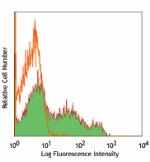
Human peripheral blood lymphocytes stained with biotinylated... -
PE anti-human CD200 (OX2)
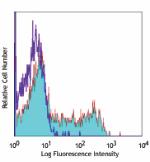
Human peripheral blood lymphocytes stained with OX-104 PE -
APC anti-human CD200 (OX2)
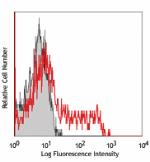
Human peripheral blood lymphocytes stained with OX-104 APC -
Brilliant Violet 421™ anti-human CD200 (OX2)
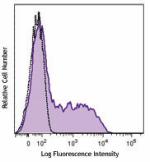
Human peripheral blood lymphocytes were stained with CD200 (... -
PE/Cyanine7 anti-human CD200 (OX2)
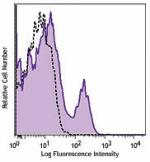
Human peripheral blood lymphocytes were stained with CD200 (... -
Alexa Fluor® 647 anti-human CD200 (OX2)
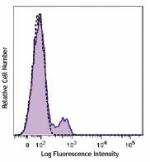
Human peripheral blood lymphocytes were stained with CD200 (... -
PerCP/Cyanine5.5 anti-human CD200 (OX2)

Human peripheral blood lymphocytes were stained with CD4 APC... -
Brilliant Violet 605™ anti-human CD200 (OX2)
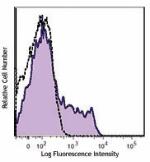
Human peripheral blood lymphocytes were stained with CD200 (... -
Purified anti-human CD200 (OX2) (Maxpar® Ready)
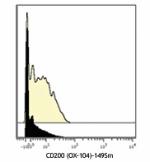
Human PBMCs stained with 149Sm-anti-CD200 (OX-104). B cells ... -
APC/Cyanine7 anti-human CD200 (OX2)

Human peripheral blood lymphocytes were stained with CD4 APC... -
Brilliant Violet 711™ anti-human CD200 (OX2)
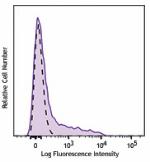
Human peripheral blood lymphocytes were stained with CD200 (... -
APC/Fire™ 750 anti-human CD200 (OX2)
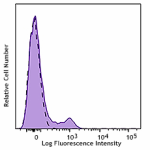
Human peripheral blood lymphocytes were stained with CD200 (... -
Ultra-LEAF™ Purified anti-human CD200 (OX2)
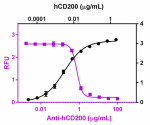
Recombinant biotinylated hCD200 (Black circles, Cat. No. 770... 
Human peripheral blood lymphocytes were stained with CD4 APC... -
TotalSeq™-C0447 anti-human CD200 (OX2)
-
TotalSeq™-D0447 anti-human CD200 (OX2)
-
TotalSeq™-A0447 anti-human CD200 (OX2)
-
TotalSeq™-B0447 anti-human CD200 (OX2)
-
Spark YG™ 581 anti-human CD200 (OX2)

Human peripheral blood lymphocytes were stained with anti-hu... -
PE/Fire™ 700 anti-human CD200 (OX2)

Human peripheral blood lymphocytes were stained with anti-hu...










Follow Us